JICA is leading the way in human resource networking using social media. It is an effort to further strengthen the many connections JICA has cultivated with people in developing countries over years of using digital technology. JICA's extensive human network is now attracting the attention of private companies interested in exploring business opportunities in developing countries.
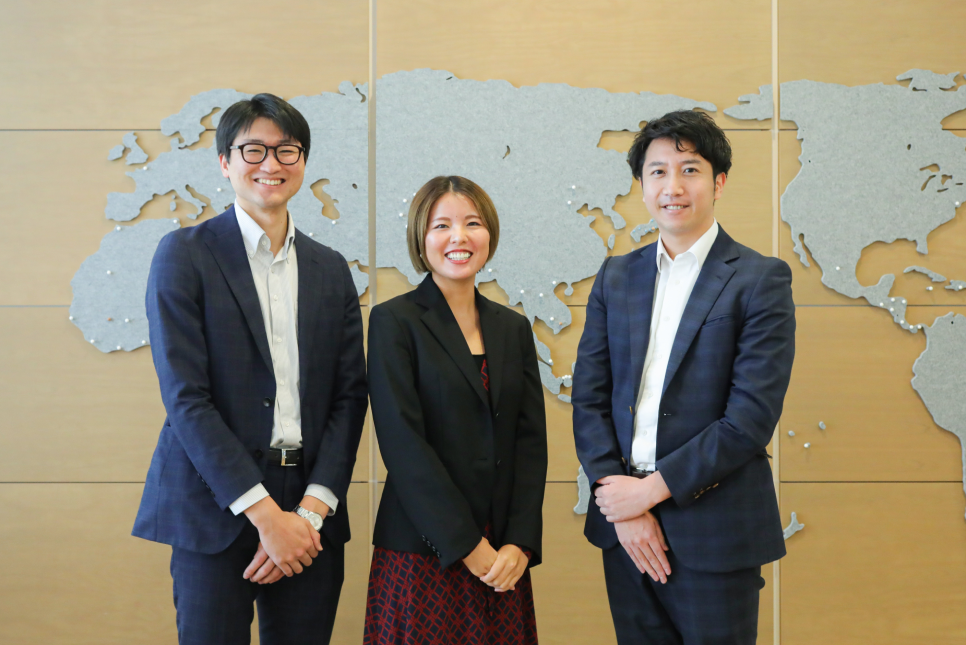
Three of the young JICA colleagues who are working to create a human resource network using digital technology. Left to right: Kohei Sato and Sako Ikewada, Planning and TICAD Process Division, Africa Department, and Tasuku Yoshida, Office for STI & DX, Governance and Peacebuilding Department
Making the Most of Relationships with JICA’s 687,000 Trainees
Tasuku Yoshida, Office for STI & DX, Governance and Peacebuilding Department, is in charge of promoting human resource networks using social media. "Over the years, JICA has attracted about 687,000 training participants from developing countries,” he says. “Among them are government officials, engineers, and young talents who will be responsible for nation-building in their countries. Isn’t it exciting to leverage more of these connections?
In the past, JICA trainees who learned specialized skills in Japan often lost touch with their connections to Japan once they returned to their home countries. Some of those trainees are now in key positions in their respective countries. If we can make better use of these connections through the power of digital technology, we may be able to create new value and develop co-creation of JICA projects.
In 2020, JICA began networking through LinkedIn, one of the most popular social networking media. "Real names are used on LinkedIn, and the site clearly states the contributor's career and their field of work,” Yoshida says. “We are creating a system where the JICA trainees who want to continue relationships can participate and share their work and experiences to strengthen their connections. This system provides a two-way street for maintaining face-to-face relationships.
JICA has also established an online learning system so that trainees can share knowledge that goes beyond their own areas of expertise. These are the ways the agency is making full use of digital technology to strengthen its human resource network and share knowledge.
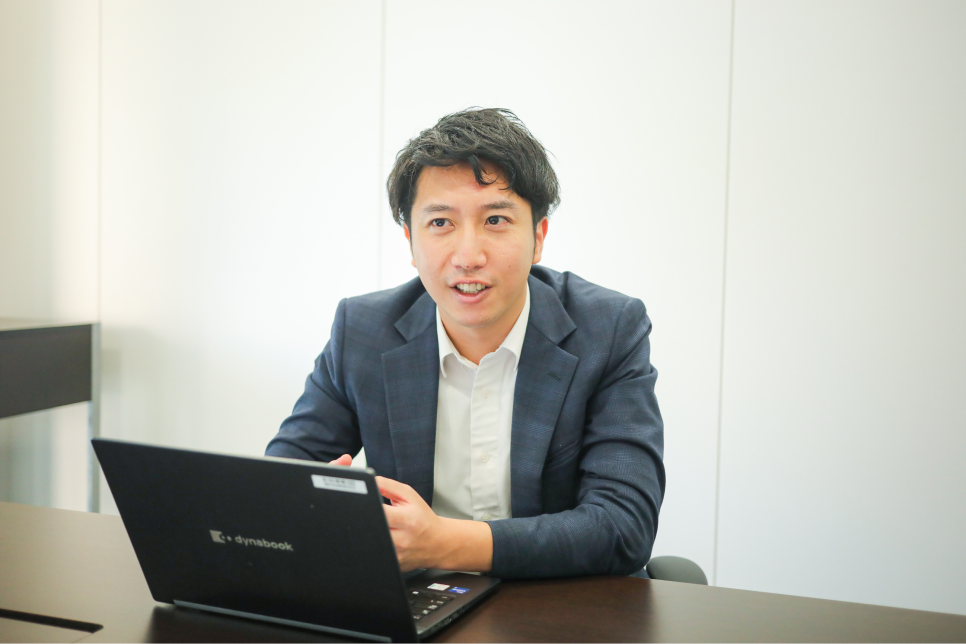
Tasuku Yoshida, Office for STI & DX, Governance and Peacebuilding Department, who is also in charge of the JICADXLab, which aims to co-create with digital partners from private companies
Yoshida is enthusiastic about increasing JICA’s presence in the private sector and promoting co-creation with digital partners "I believe that more valuable projects will develop through the opening up of JICA's projects and its human resource network to private companies and by generating opportunities for co-creation,” he says.
Connecting with the Youth Who Will Lead Africa's Future
As of December 2023, JICA has 15 LinkedIn groups covering different fields, with participants from JICA’s training program, Japan Overseas Cooperation Volunteers (JOCV) members, and corporates engaging in the JICA’s training program or seeking global talents. The largest of these is the The ABE Initiative (African Business Education Initiative for Youth) group, in which more than 1,000 participants and graduates of the ABE Initiative participate.
The ABE Initiative is a program that invites to Japan highly motivated young Africans who are eager to contribute to Africa’s development. The program provides these young Africans with opportunities to seek for master's degree in Japanese universities and internships at Japanese companies. Many graduates turn out to actively play a role in bridging Africa and Japan.
Sako Ikewada and Kohei Sato, of the Africa Department’s Planning and TICAD Division, are responsible for managing the ABE Initiative's LinkedIn group, which supports active networking among the graduates and also serves as a point of contact with private companies.
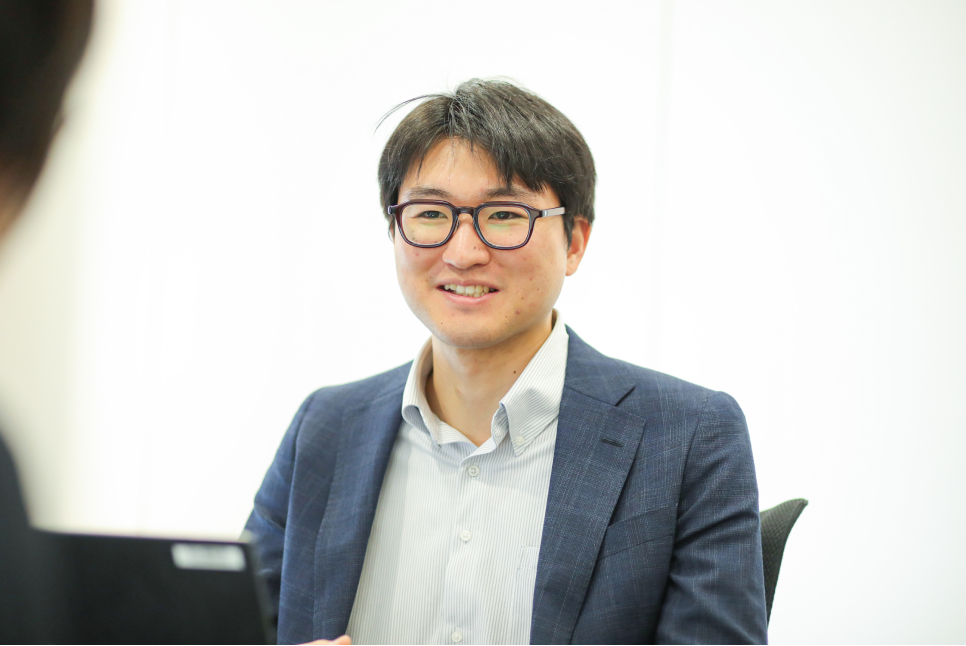
"The challenge is how to get people to use this LinkedIn group on a daily basis," says Kohei Sato, Planning and TICAD Process Division, Africa Department.
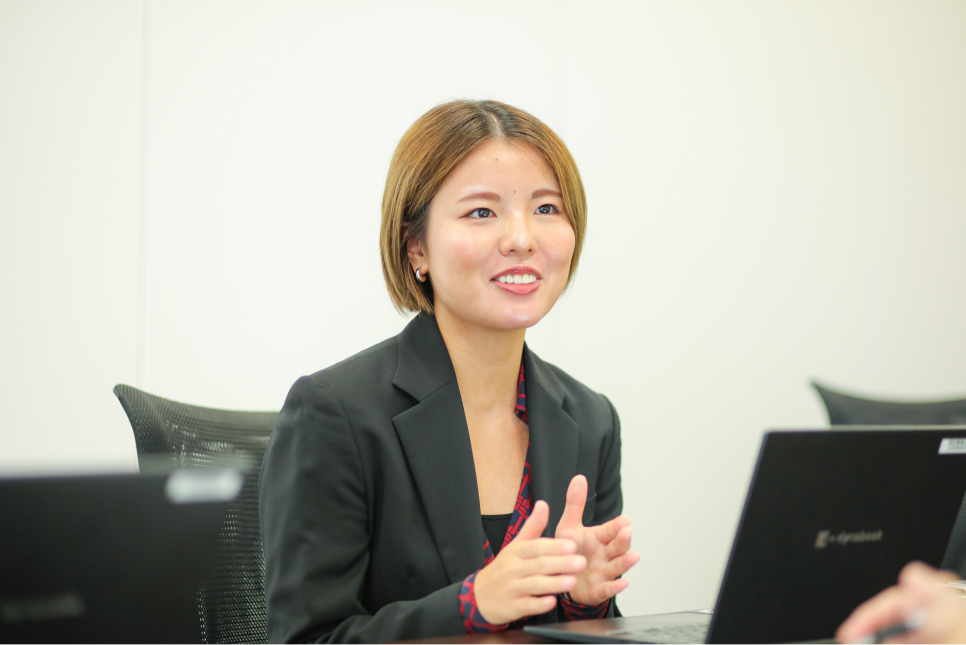
Sako Ikewada, from the Africa Department’s Planning and TICAD Process Division, also worked on an online exchange event between ABE Initiative students and Overseas Cooperation Volunteers who have started their own business in Africa.
Sato says that the ABE Initiative, which began in 2013, has hosted more than 1,700 young African to date. About 60 percent of them have joined this LinkedIn group. “Since March 2023, we extend our group to the Japanese companies that have offered internship program to the ABE Initiative students for diverse and greater connections," he says.
Ikewada continues to make efforts supporting active networking. "I check posts frequently to keep this group active,” she says. “I encourage new ABE Initiative students and companies to introduce themselves. Also, I frequently post reports on events and gatherings held." She aims that the group will evolve to be a place where the thousands of ABE Initiative cohorts get to know each other and innovative collaborations are emerged organically.
We asked Nobuhiko Matsumoto, Director of Ascentia Holdings Co., Ltd., which operates a franchise business. Ascentia is a showcase how a Japanese company uses the LinkedIn group to attract and find interns from the ABE Initiative students. The company has so far engaged more than 100 ABE Initiative African talents for its internship program.
Learning About the Real Needs of Africa
According to Matsumoto, "Talents from ABE Initiative are highly invaluable for Japanese corporates to create a steppingstone for the African market because they know what is happening both in Africa and Japan."
Matsumoto is currently working with Sergio Morais, a graduate of the ABE Initiative, on a self-service laundromat franchise business in his home country of Mozambique.
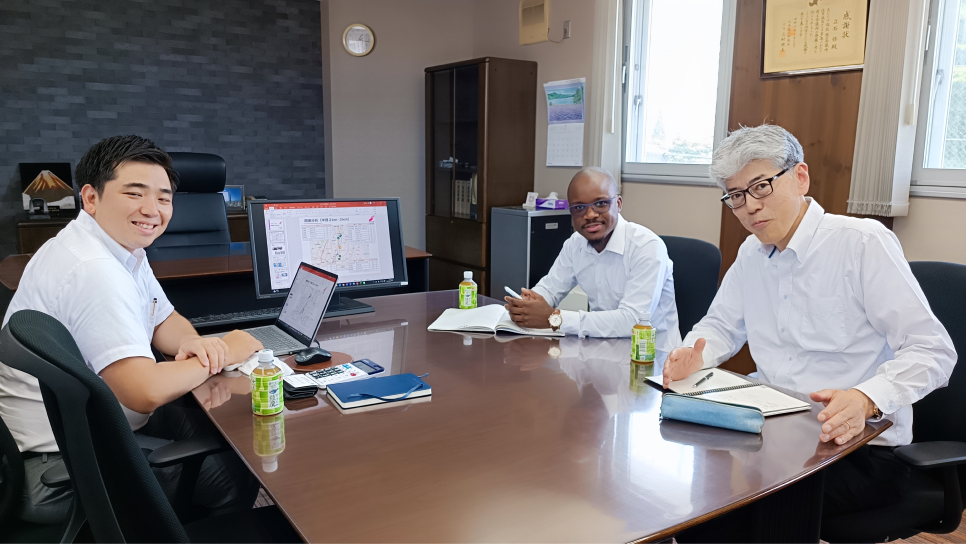
Matsumoto (left) and Morais (center) at a meeting discussing the laundromat business.
When Morais applied for an internship at Ascentia Holdings, he expressed his desire to create this business. While exploring the possibilities with some skepticism, he took advantage of the ABE Initiative's LinkedIn group to recruit colleagues and also conduct online surveys on the demand for laundromats in Africa.
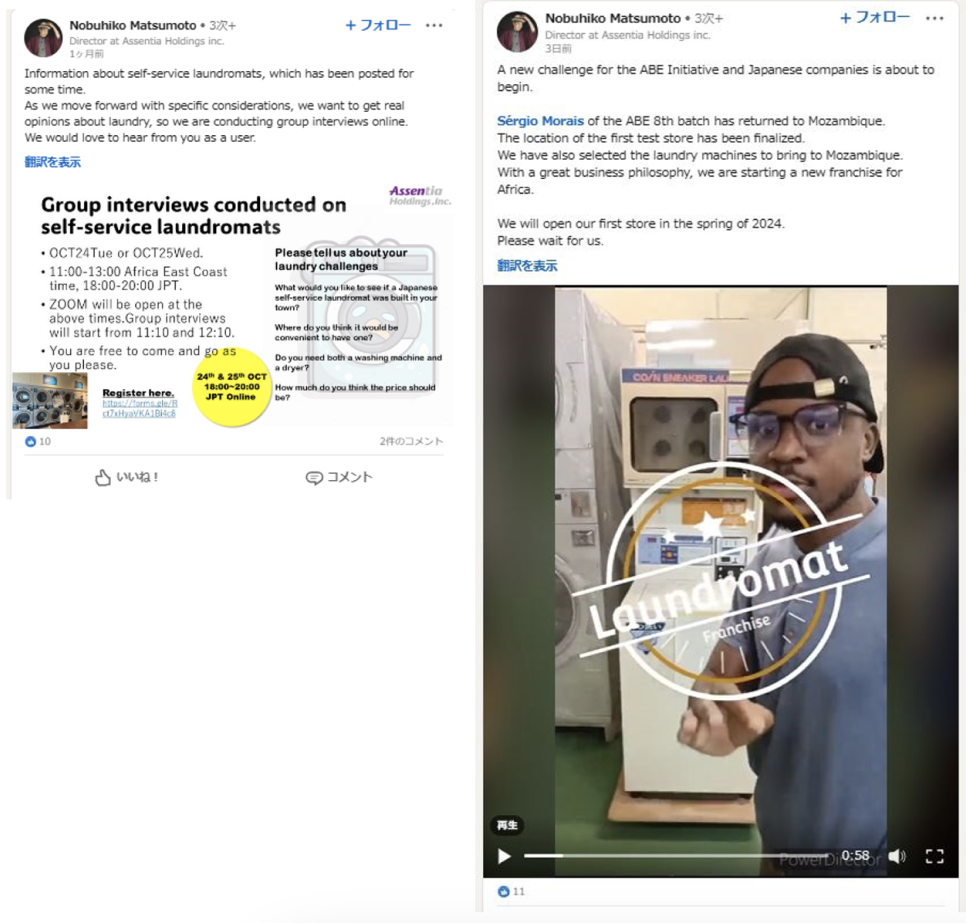
Matsumoto uses the ABE Initiative's LinkedIn group as a tool for business development in Africa.
Matsumoto is now working with ABE Initiative graduates to develop a franchise business for an inexpensive plant-activating agent developed by a Japanese company that utilizes the function of microorganisms. The franchise business was initiated by an ABE Initiative student who expressed a desire to operate this project in Mauritania. The business is expected to improve the agricultural productivity of small-scale farmers, who account for the majority of farmers in Africa.
Matsumoto says that the ABE Initiative's LinkedIn group is a gateway for his company to the business development in Africa. Through the platform, he gets to know the young, bright African talents while he can identify real challenges and needs of African countries. "There are so many young talents aspiring for build a better future for their own countries. I sincerely feel inspired, and motivated to work with them," he says.
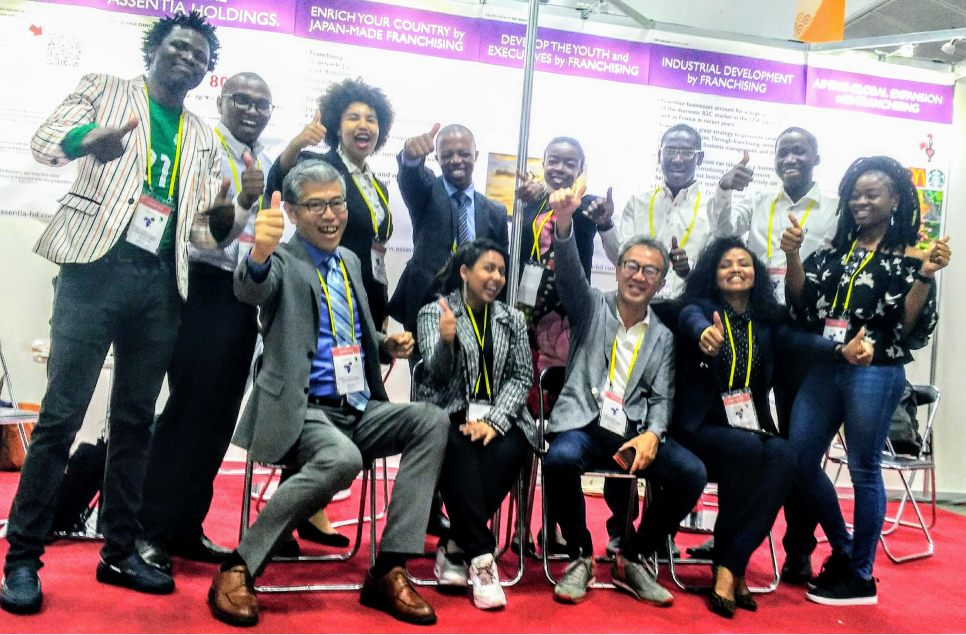
At the Seventh Tokyo International Conference on African Development (TICAD) held in Yokohama in 2019, Matsumoto (front row, left) introduced the potential of a franchise business in Africa with interns from the ABE Initiative.
Please contact below if you have any comments or questions about the ABE Initiative LinkedIn group
abe2@jica.go.jp






scroll